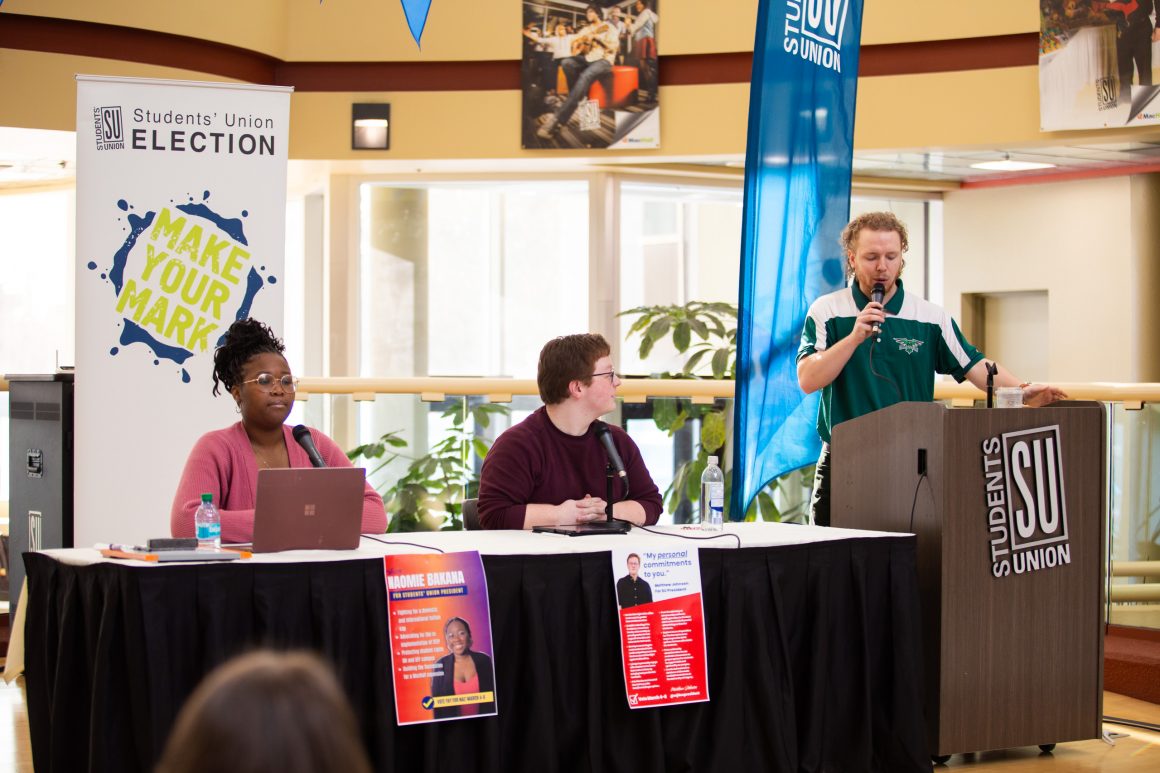
The SU presidential race: experience vs. fresh blood
By Josie Simon, March 5 2025—
The upcoming Students’ Union (SU) general election presents voters with a choice between two candidates who couldn’t be more different. Naomie Bakana, the establishment insider who’s spent years in the SU ecosystem, and Matthew Johnson, a political science sophomore whose resume raises more questions than it answers.
The insider vs. the outsider
Naomie Bakana represents the definition of an SU insider. As the current VP Internal, she’s already part of the executive team, transitioning seamlessly from Faculty of Arts Representative before that. She knows the institution inside and out — which should immediately raise red flags for voters seeking meaningful change.
Bakana’s reports highlight achievements, including advocating for on-demand transit services for the Spy Hill campus, addressing food security through initiatives like “Pack the Pantry,” working on the Sexual and Gender-Based Violence Policy review and pushing for better support for international students who have accessed emergency funding.
However, despite the SU executive team’s overall advocacy efforts, persistent issues with tuition increases, inadequate student housing and lacklustre campus amenities remain unresolved. While the SU is not responsible for these issues per se, Bakana’s reports acknowledge these as “ongoing issues” rather than solved problems.
For example, while the team helped secure the Spy Hill transit pilot, students weren’t properly informed ahead of time and “had to spend excess funds on vehicles they didn’t need,” according to Bakana’s executive report. While Bakana stated that she was working with the Director of Ancillary Services to address this over her term, it is only in the winter semester that a solution of mass communication was proposed.
An establishment candidate, despite having institutional memory, might simply perpetuate the status quo under the guise of institutional knowledge, continuing incremental approaches rather than pursuing the bold changes many students desire.
The transparency problem
Matthew Johnson presents his own set of concerns. His campaign materials claim he has “worked in both city and federal politics” — an impressive credential for a second-year student if it were entirely accurate. When I interviewed Johnson, he admitted volunteering briefly, which is very different from paid employment experience that the term “work” implies to most students.
More troublingly, I discovered during our interview that Johnson removed his Liberal Party of Canada volunteering from his LinkedIn profile. When asked about this omission, he claimed he “wanted to move on” and the decision “came from a personal place.”
While SU candidates must be non-partisan in their roles — which Johnson technically is now — this doesn’t mean they should erase traces of their political past. He admitted he “was a member” of the Liberal Party and even “sat on the YLC Policy Committee,” yet none of this appears on his professional profile.
While Johnson does not have to publish this information, students deserve to know who they’re voting for, including their prior political affiliations and experiences. This sanitizing of his profile raises questions about transparency. If a candidate removes potentially relevant details about their background, what else might students not know about their presidential hopeful?
Naïve promises vs. recycled ideas
Johnson’s platform overflows with grandiose promises that lack concrete implementation plans. He pledges to “use the full weight of the office to advocate for greater internet infrastructure” while “pushing the University Government Relations department to lobby the province for more funding” — a convoluted strategy revealing his inexperience with how university advocacy works. His vow to “find a non-profit construction outfit to build affordable housing” demonstrates a fundamental misunderstanding of the university’s property development processes and timelines.
Bakana’s platform, meanwhile, recycles ideas that are already in progress. Her pledge to “oppose all tuition increases” is hardly revolutionary — it’s the bare minimum expected of any SU president. Her promise to “continue the work being done to advocate the Student Temporary Employment Program (STEP)” merely commits to maintaining existing strategies rather than offering fresh solutions.
The apathy problem
Perhaps most concerning is what this race reveals about our campus political culture. Johnson, with limited relevant experience, appears to be stepping into the presidential race by virtue of being a political science major with modest political volunteer experience on his résumé. Bakana, having already secured a seat at the executive table, seems to be seeking promotion through institutional inertia rather than transformative leadership, appearing to ride the wave of her insider status while offering little evidence of meaningful impact in her current role.
Are these really the best candidates our student body can produce? The lacklustre choices reflect a broader apathy problem that should concern us all. When student engagement is so low that our presidential choices are between an inexperienced outsider with transparency issues and an establishment figure who’s already part of the system she claims needs fixing, we all lose.
The bottom line
Voters face an uncomfortable dilemma: choose the insider who knows the system but may be too entrenched to change it or the outsider who promises fresh perspectives but lacks both experience and transparency. Perhaps the most honest ballot would include a third option: “None of the above.”
The SU needs leadership that combines institutional knowledge with genuine independence and experience with innovative thinking. Unfortunately, neither candidate fully delivers this combination.
As you head to the polls from March 4-6, vote for the candidate you believe will best represent your interests and address the issues that matter most to you. Despite their flaws, one of these candidates will become your next SU president. Whether that’s Bakana with her institutional experience or Johnson with his promise of fresh perspectives, make your voice heard.
This article is a part of our Opinions section and does not necessarily reflect the views of the Gauntlet editorial board.
